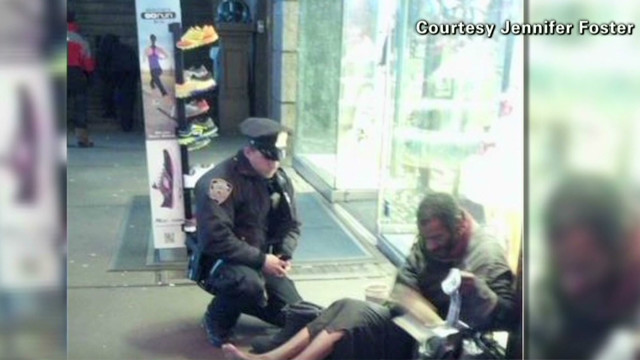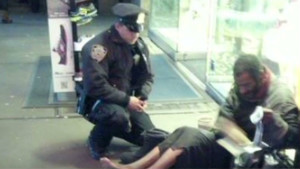Shoes a start, but homeless need far more
December 4, 2012 -- Updated 1955 GMT (0355 HKT)

The story of Jeffrey Hillman highlights homeless issues
STORY HIGHLIGHTS
- Frida Ghitis: People moved by story of police officer who gave shoes to homeless man
- She says kind act is great, but wealthy nations must take lead to help the homeless
- She says in "fiscal cliff" haggling politicians must consider government's role in this issue
- Ghitis: Some nations, like Sweden, make strides on homeless, but all should
Editor's note: Frida
Ghitis is a world affairs columnist for The Miami Herald and World
Politics Review. A former CNN producer and correspondent, she is the
author of "The End of Revolution: A Changing World in the Age of Live
Television." Follow her on Twitter: @FridaGColumns.
(CNN) -- Americans love a hero. Everybody does. So who could resist the touching story
of the New York policeman who, seeing a homeless man sitting barefoot
in the cold, walked into a shoe store and bought him a new pair of
all-weather boots?
The picture of clean-cut
Officer Larry DePrimo kneeling before bearded, straggly Jeffrey Hillman
became an Internet sensation. More than 1.6 million people saw it in the
first 24 hours after the New York Police Department posted the image,
which was snapped by a tourist.
Chapter 1 of this story moved millions to shed a tear, and one hopes it inspired countless acts of kindness.

Frida Ghitis
 Cop: I knew I had to help this man
Cop: I knew I had to help this man
Now, we have Chapter 2. And it should move us even more.
Hillman, who became much less famous than his benefactor, is barefoot once again.
And the story, as it turns out, is much more complicated than we ever thought. New York City officials say Hillman has had an apartment but, for some reason, returns to the streets.
Despite veterans
benefits, federal Section 8 assistance and Social Security, he sits on
the cold New York pavement and, barefoot, walks its streets.
Clearly, this is a sad situation that will not be resolved with the purchase of a new pair of shoes.
Indeed, while DePrimo
deservedly received accolades and media attention, we heard almost
nothing about the homeless man; there was never any reason to believe
his fortunes had improved. After providing protection for his blistered
feet, society simply moved on, happy to pat itself on the back for a job
well done -- and just in time for Christmas.
New York Police Commissioner Raymond Kelly gave DePrimo a pair of cuff links. As for Hillman, Kelly flippantly explained, "We're not looking for him. He has shoes now. He's much more difficult to spot."
Hillman, 54, has told
reporters that he hid the shoes because "they are worth a lot of money."
The explanation is not important. Hillman's family told a reporter that "Jeffrey has his life, and he has chosen that life."
But can the country turn its back on one of its own, a homeless military veteran, and say "it's his choice"?
Remember the homeless man with the velvet voice, Ted Williams? He, too, was rescued by a miracle. But he needed help, substance abuse treatment, before he could keep a job: before he could keep on his all-weather boots.
What matters is that
Hillman, like thousands of others, in the street, in a country that,
despite all its economic challenges, remains the richest nation the
world has seen. What matters is that a heartwarming act of kindness -- a
man opening his wallet to buy another man shoes -- is not enough to
keep him from going barefoot.
Some problems are too
big for individuals to tackle alone. Some problems, such as
homelessness, require complex solutions. Some problems remind society
that when it came together and organized, it created government.
The reminder is
particularly timely now as the country's leaders negotiate over the
"fiscal cliff." The talks are a political contest. But they are also
about the soul of the nation. America's leaders are discussing the
country's guiding philosophy. Sadly for the Jeff Hillmans of America,
the weakest of the weak, America seems to have decided it has less money
to help its neediest.
Other nations are
undergoing similar debates about their own identity and values. America
is not the only country with a homelessness problem, and charges that
the United States is callous and indifferent to the poor, which I have
often heard abroad, are simply false.
The U.K.-based Charities Aid Foundation, says Americans are the most generous
people on earth. Last year, 65% gave money, 43% gave time, 73% helped a
stranger. Despite the economic slump, three-quarters of the giving,
$217 billion, came from individuals. Corporations and foundations gave
$56 billion.
Those are amazing numbers. Americans should be proud.
Still, thousands sleep out in the cold. In Atlanta,
just down the street from CNN's headquarters, drivers can spot homeless
camps under highway overpasses. One caught fire a few weeks ago.
Homeless life is stressful and dangerous.
Practically every major
city in the world is home to people sleeping in the streets. An estimate
of homelessness in Paris about a decade ago put the number
there at 12,000. Up-to-date figures are bitterly disputed. The
consensus among advocates is that numbers have climbed significantly. In
the United States, 2010 census figures show some of the highest
percentages of "street homeless" in California. According to those figures, New York has one homeless person for every 2,506 people, compared with one for every 259 in San Francisco.
New York authorities claim to have reduced the number of "unsheltered" individuals to about 3,000, 26% fewer than in 2005. The Coalition for the Homeless says statistics underestimate the problem.
Some studies show much higher,
but that is because the term "homeless" includes people living in
emergency housing. In this case, we are referring to the worst category
of chronic homelessness: people who spend most nights in the streets.
Whatever the figure, more can be done.
In Sweden, a determined government effort
brought the number of people living in the streets to just 280, with
thousands receiving help in alternative housing. I once saw a city
worker in Stockholm help a homeless man off the pavement and walk with
him onto a city bus. The government seems to have a handle on the
situation of each homeless individual.
Not all places are the same. Cities such as Paris and New York have many more immigrants,
more newcomers with fewer connections to the community, with less of a
safety net. There is also more poverty, inequality, unemployment.
The Christmas Miracle
story of the police officer and the homeless man faded in an Internet
minute. And then we moved onto the next social-media sensation. But it
continued for the man who should have garnered more attention from the
beginning.
The story is not over.
Not for Jeffrey Hillman. Not for any of the homeless people in the
streets of New York or Paris, Stockholm or Atlanta, whom we glimpse
briefly as we move on with our lives.
The shoes help; the cash
helps. But the more effective act of generosity, the real miracle,
would come if the millions looking at the picture of the generous police
officer trying to help a man in need wrote the perfect Chapter 3,
pushing for better mental health services, more affordable housing, more
job training. For enough attention from the government to those who
need it most.

ไม่มีความคิดเห็น:
แสดงความคิดเห็น